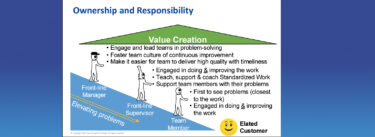Alice Lee (Former Executive Director, Strategy and Administration, Lean Enterprise Institute)
 I’ve found that leaders tend to think they have to have all the answers, and that tendency is no different on gemba walks. The point of a gemba walk is to “Go and See (and listen),” but I’ve seen leaders struggle with the “See (and listen)” as they are more comfortable with “Do (and tell).” That can be extremely uncomfortable for them, to have to watch all these mistakes happening right in front of them and not be able to do anything to correct them. I see it happen over and over again as a lean coach.
I’ve found that leaders tend to think they have to have all the answers, and that tendency is no different on gemba walks. The point of a gemba walk is to “Go and See (and listen),” but I’ve seen leaders struggle with the “See (and listen)” as they are more comfortable with “Do (and tell).” That can be extremely uncomfortable for them, to have to watch all these mistakes happening right in front of them and not be able to do anything to correct them. I see it happen over and over again as a lean coach.
Over time I realized that I needed to do a better job of setting the stage for learning and determine the purpose with the leader in advance, so no one would be caught off-guard. Before we set out, we would discuss the importance of leaving preconceived notions behind:
“You don’t have to have all the answers. You’re going to see problems, you’re going to see things that might make you nervous, and you’re going to want to jump in and fix it.
“But I need you to just go in with a questioning and nonjudgmental mindset and think, ‘What is actually happening? What am I actually seeing and what do I now know? What else do I need to know and how will I learn it?’”
I want the learner to be present in the moment and listen to the voice of the gemba and truly grasp the situation.
We, as leaders, have become accustomed to drawing conclusions with “facts” far from the gemba and so acknowledging this is not easy and takes mindful guided practice and discipline as the first step to deeper learning.
Sammy Obara (President, Honsha Associates)

Leaders sometimes think that by copying Toyota tools they will automatically obtain Toyota results.
I’ve had my share of situations where companies were introducing tools like Kanban (a random example of a popular tool), because they saw that “Toyota uses them everywhere.” Perhaps the question that comes before “How do I use it?” should be “Why do they use it?” Kanban is the typical case where Toyota created a solution for a problem they had, but that many other companies don’t have. And, by extension, they shouldn’t be using that same solution.
This explains why we often see companies using this artificial method created by Toyota to connect their processes (again, artificially), instead of doing it physically. There are some constraints that could justify the adoption of the same tools that Toyota uses. A Kanban, in this case, could be used as a last resort, when processes are difficult to connect – rigid and different cycle times, multi-shared processes and physical restrictions are good examples. Regardless, it’s important to remember that lean is not a one-size-fits-all approach, and what works for Toyota may not work for you.
Jim Luckman (Partner, Lean Transformations Group LLC)

The biggest problem I see is that lean leaders think of lean as a new program, like Six Sigma or Culture Change. There are many articles showing that a program approach does deliver the expected outcomes and yields about 70 percent failure rates. Generally, the program approach adds additional work on top of the existing work and creates additional overburdening of the existing workforce. Often, the Lean program is delegated to an internal continuous improvement group and the leadership practices and the existing systems are not challenged. Additionally, Lean programs are spread across organizations without connecting to the critical business problems that need to be addressed.
The program approach is what I have called “doing Lean.” The more appropriate approach is to think of Lean as a new process of experiential organizational learning. I have called this process “becoming Lean.” Included in this process are how to define problems, how to engage the entire organization in addressing problems at their level, and how to create an ongoing and continuous process for more effectively serving value to the customers.
Since this learning process is foreign in most organizations, it needs to be developed and grown from within through selected areas based on definition of business needs. Starting with small experiments where people are solving their real problems, new problem solving and social skills can be created. When this is done properly, a new social system emerges based on trust and respect that yields a more effective operational model. With the leader focused on how the organization is responding to these experiments, she can encourage a higher level of problem solving at the systems level, which includes looking at the existing policies and leadership behaviors that need to change. This is a model of multi-level learning that not only can create extraordinary performance improvements, but also create a culture that is continuing to improve.







